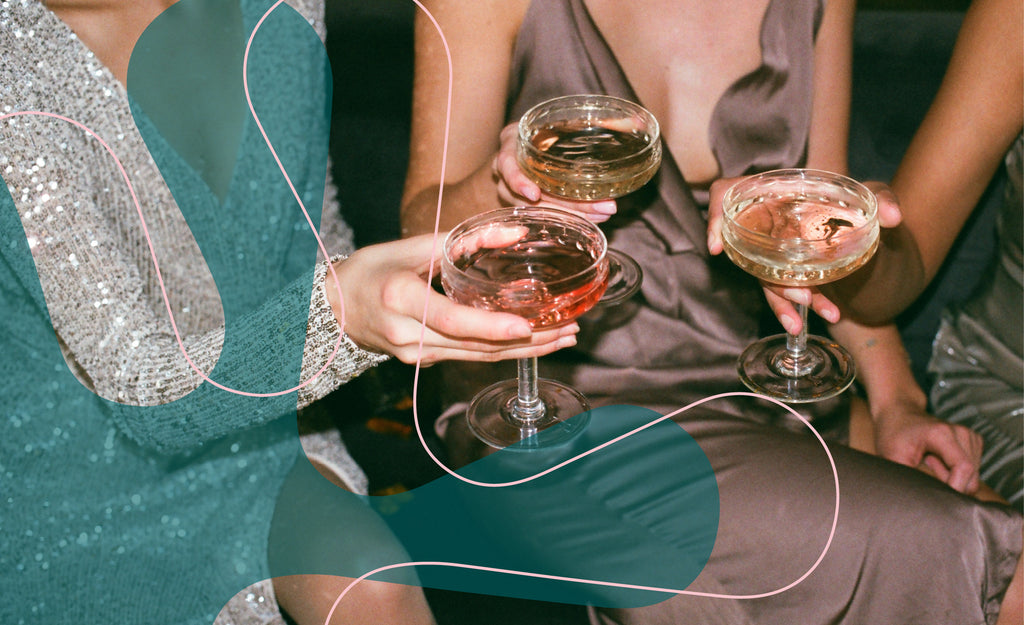Alcohol has always been in my life, but it has never played a starring role. Sure, I’ve had a sip of white wine, champagne, and a mimosa here and there. But, each time, I felt immediately nauseous, so I stopped trying to force myself to like alcohol. One of my anxiety triggers is vomiting, so I do everything I can to avoid the possibility of it happening—one of them is being sober. Plus, I find comfort being in control, and thus, drinking has just never been my thing. When you don’t know what you’re “missing” (note the intentional quotations), it’s actually pretty easy to not feel FOMO. I’ve never even been drunk, which shocks most people. A common follow-up is: “Good for you. I could never do that.”
“Younger women don’t bat an eye when I tell them I don’t drink,” says Mia Mancuso, a nurse and founder of the blog and online community The Sober Glow. “It’s the women in their late 30s and 40s who tend to dig deeper and want to know my ‘dirt’ and tend to get more defensive about their own drinking.”
Although I’m perfectly secure in my chosen life as a teetotaler (once you’ve successfully dated while sober, you’ve pretty much nailed it), the alcohol convo has become more unrelenting since I started my career. Drinking is ingrained in the workplace, from Zoom happy hours to office parties and “grabbing a drink” with a client. Alcohol makes up the “play” part of that tired old chestnut, “work hard, play hard.” It’s a convenient shortcut for building office culture, an inebriant that makes everyone just a little friendlier. Or, as Millie Gooch, founder of Sober Girl Society and author of The Sober Girl Society Handbook, puts it: “Alcohol is seen as the ultimate bonding elixir, it bonds you with people you wouldn’t normally bond with.”
Without this so-called elixir, I’ve often felt isolated in these buzz-induced conversations. At monthly work socials, when everyone would just stand around the office and drink wine, I’d usually stay at my desk and work. And although I’ve gotten used to navigating the world—and the workplace—as a non-drinker, it gets more difficult this time of year.
“The question inevitably goes, ‘Red or white?’ Uh…water? It’s the assumption that everyone drinks that hurts sober people the most.”
At my previous employer, we were all given gift cards towards alcohol as our end-of-year perk, or a bottle of wine or champagne. When I left the job, my boss gave me a bottle of wine as a parting gift on my last day. I want to acknowledge how generous and thoughtful these gifts are, but because I’ve always been very open about my sobriety, I felt like I wasn’t heard.
Because of my background in media, events and brand parties are common, and they tend to ramp up around this time of year. They can also be a bit awkward. You’re almost always greeted with alcohol as soon as you walk in the door. The question inevitably goes, “Red or white?” Uh… water? It’s the assumption that everyone drinks that hurts sober people the most. And I can only imagine how much harder it would be for those in recovery.
Still, the culture is changing. More people are trying out the sober-curious lifestyle, restaurants and bars are expanding their roster of non-alcoholic options with sophisticated mocktails and complex recipes that rival any negroni, and I’ve even attended a (super fun) sober bar crawl last year. And Gooch, who has been sober for 4 years, says that the reactions she encounters now are far more positive than when she first started sharing her POV as a non-drinker.
That said, workplace culture still has a long way to go. “With anything, there needs to be education, especially for owners and managers,” says Mancuso. “Creating an atmosphere where all are welcome, or having events that don’t center around alcohol (a.k.a. the legendary ‘happy hour’) is key.” Gooch agrees: “Employers can definitely cater to sober employees by offering non-alcoholic options at parties or as gifts—there are so many fancy non-alcoholic fizz brands now.” (Some of our faves include: Seedlip, Lumette, Søbrii, HP Juniper, Gimber, and Surely Wines). “If you’re a sober employee, chat to your boss about this because everyone deserves to feel included,” she adds. And if you’re a manager, be mindful if there’s anyone on your team who’s sober or sober-curious, and plan accordingly. The responsibility of creating a comfortable environment shouldn’t always fall on the non-drinker.
Gooch admits that she has fewer friends (read: drinking buddies) at work. “But I get on incredibly well with my team, and my relationships are simply professional. After all, there’s nothing worse than ruining a respected relationship by getting sozzled at the work Christmas party.”
So, if you’re heading into the holiday season as a sober employee (hi, welcome to the party!), Mancuso has some gentle reminders. One, you’re not required to tell anyone you don’t drink (and you can be discerning with who you do tell). Two, you should never change your choices to make someone else more comfortable. And finally, remember your “why”—hey, it might even inspire someone. And if nothing else, being the only one not hungover the day after the company karaoke night feels pretty damn great.
READ MORE
A CEO Sounds off on the 4-Day Work Week
How Melody Lim Turned the Nostalgic Power of Scent Into a Thriving Business
Telsha Anderson Couldn’t Find a Job in Fashion—So She Made One



